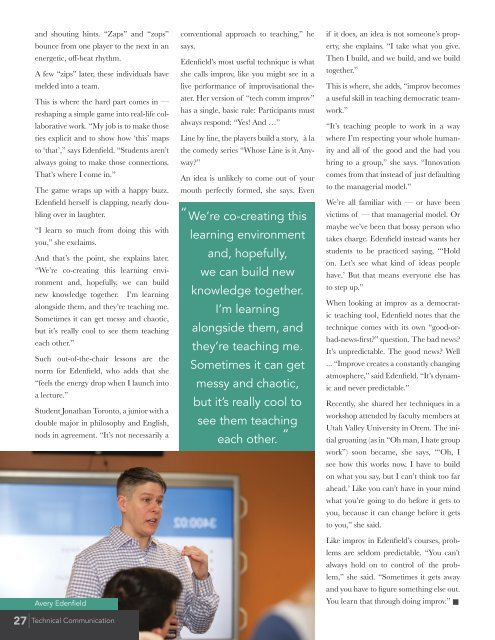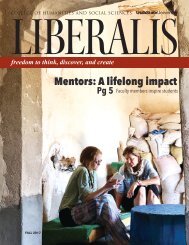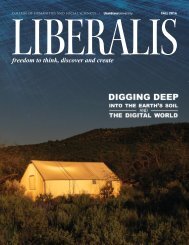liberalis-summer-2017-print
You also want an ePaper? Increase the reach of your titles
YUMPU automatically turns print PDFs into web optimized ePapers that Google loves.
and shouting hints. “Zaps” and “zops”<br />
bounce from one player to the next in an<br />
energetic, off-beat rhythm.<br />
A few “zips” later, these individuals have<br />
melded into a team.<br />
This is where the hard part comes in —<br />
reshaping a simple game into real-life collaborative<br />
work. “My job is to make those<br />
ties explicit and to show how ‘this’ maps<br />
to ‘that’,” says Edenfield. “Students aren’t<br />
always going to make those connections.<br />
That’s where I come in.”<br />
The game wraps up with a happy buzz.<br />
Edenfield herself is clapping, nearly doubling<br />
over in laughter.<br />
“I learn so much from doing this with<br />
you,” she exclaims.<br />
And that’s the point, she explains later.<br />
“We’re co-creating this learning environment<br />
and, hopefully, we can build<br />
new knowledge together. I’m learning<br />
alongside them, and they’re teaching me.<br />
Sometimes it can get messy and chaotic,<br />
but it’s really cool to see them teaching<br />
each other.”<br />
Such out-of-the-chair lessons are the<br />
norm for Edenfield, who adds that she<br />
“feels the energy drop when I launch into<br />
a lecture.”<br />
Student Jonathan Toronto, a junior with a<br />
double major in philosophy and English,<br />
nods in agreement. “It’s not necessarily a<br />
Avery Edenfield<br />
27 Technical Communication<br />
conventional approach to teaching,” he<br />
says.<br />
Edenfield’s most useful technique is what<br />
she calls improv, like you might see in a<br />
live performance of improvisational theater.<br />
Her version of “tech comm improv”<br />
has a single, basic rule: Participants must<br />
always respond: “Yes! And …”<br />
Line by line, the players build a story, à la<br />
the comedy series “Whose Line is it Anyway?”<br />
An idea is unlikely to come out of your<br />
mouth perfectly formed, she says. Even<br />
“ We’re co-creating this<br />
learning environment<br />
and, hopefully,<br />
we can build new<br />
knowledge together.<br />
I’m learning<br />
alongside them, and<br />
they’re teaching me.<br />
Sometimes it can get<br />
messy and chaotic,<br />
but it’s really cool to<br />
see them teaching<br />
each other. “<br />
if it does, an idea is not someone’s property,<br />
she explains. “I take what you give.<br />
Then I build, and we build, and we build<br />
together.”<br />
This is where, she adds, “improv becomes<br />
a useful skill in teaching democratic teamwork.”<br />
“It’s teaching people to work in a way<br />
where I’m respecting your whole humanity<br />
and all of the good and the bad you<br />
bring to a group,” she says. “Innovation<br />
comes from that instead of just defaulting<br />
to the managerial model.”<br />
We’re all familiar with — or have been<br />
victims of — that managerial model. Or<br />
maybe we’ve been that bossy person who<br />
takes charge. Edenfield instead wants her<br />
students to be practiced saying, “‘Hold<br />
on. Let’s see what kind of ideas people<br />
have.’ But that means everyone else has<br />
to step up.”<br />
When looking at improv as a democratic<br />
teaching tool, Edenfield notes that the<br />
technique comes with its own “good-orbad-news-first?”<br />
question. The bad news?<br />
It’s unpredictable. The good news? Well<br />
... “Improve creates a constantly changing<br />
atmosphere,” said Edenfield. “It’s dynamic<br />
and never predictable.”<br />
Recently, she shared her techniques in a<br />
workshop attended by faculty members at<br />
Utah Valley University in Orem. The initial<br />
groaning (as in “Oh man, I hate group<br />
work”) soon became, she says, “‘Oh, I<br />
see how this works now. I have to build<br />
on what you say, but I can’t think too far<br />
ahead.’ Like you can’t have in your mind<br />
what you’re going to do before it gets to<br />
you, because it can change before it gets<br />
to you,” she said.<br />
Like improv in Edenfield’s courses, problems<br />
are seldom predictable. “You can’t<br />
always hold on to control of the problem,”<br />
she said. “Sometimes it gets away<br />
and you have to figure something else out.<br />
You learn that through doing improv.”<br />
spring-<strong>2017</strong>.indd 28<br />
7/13/17 12:25 PM







